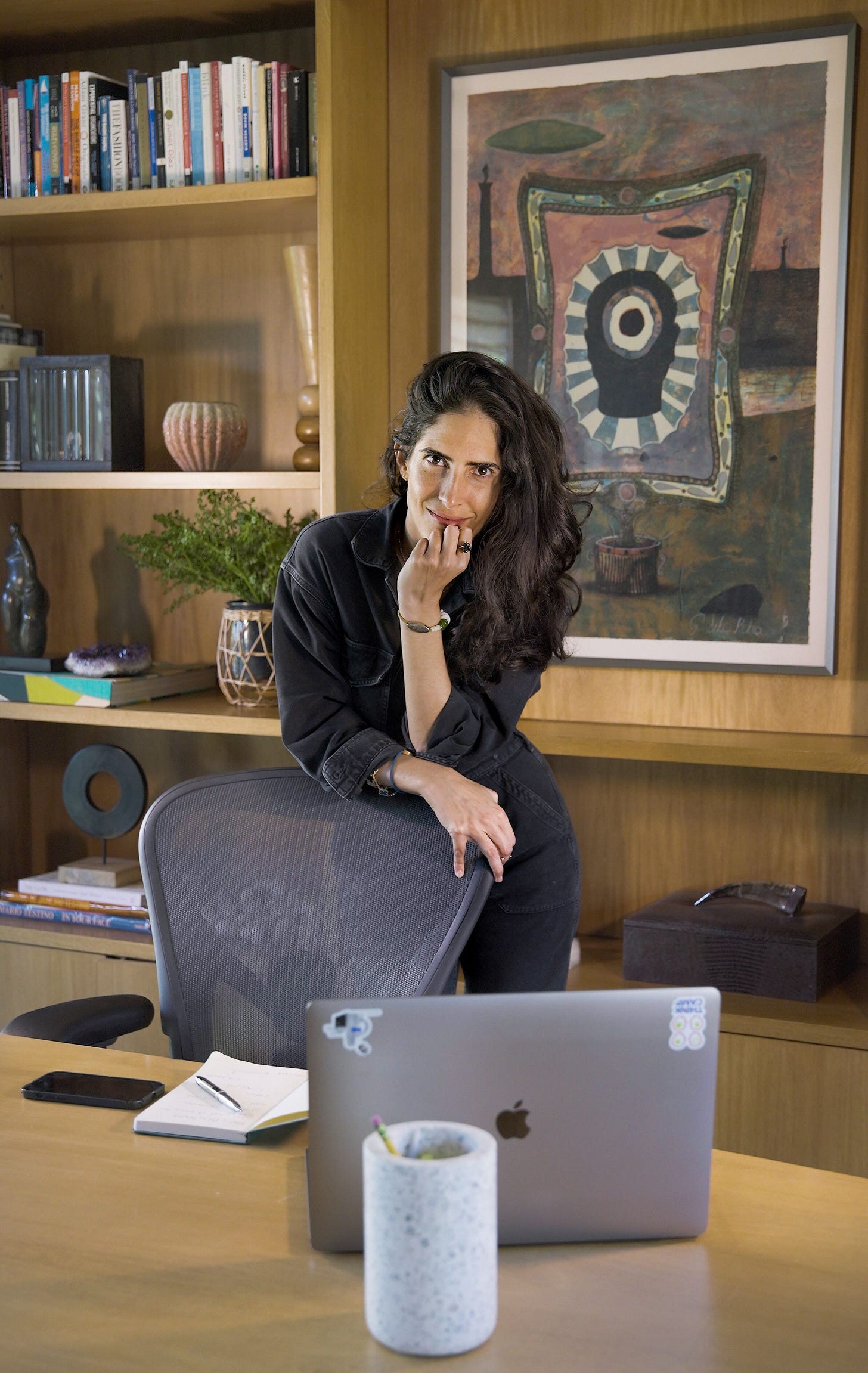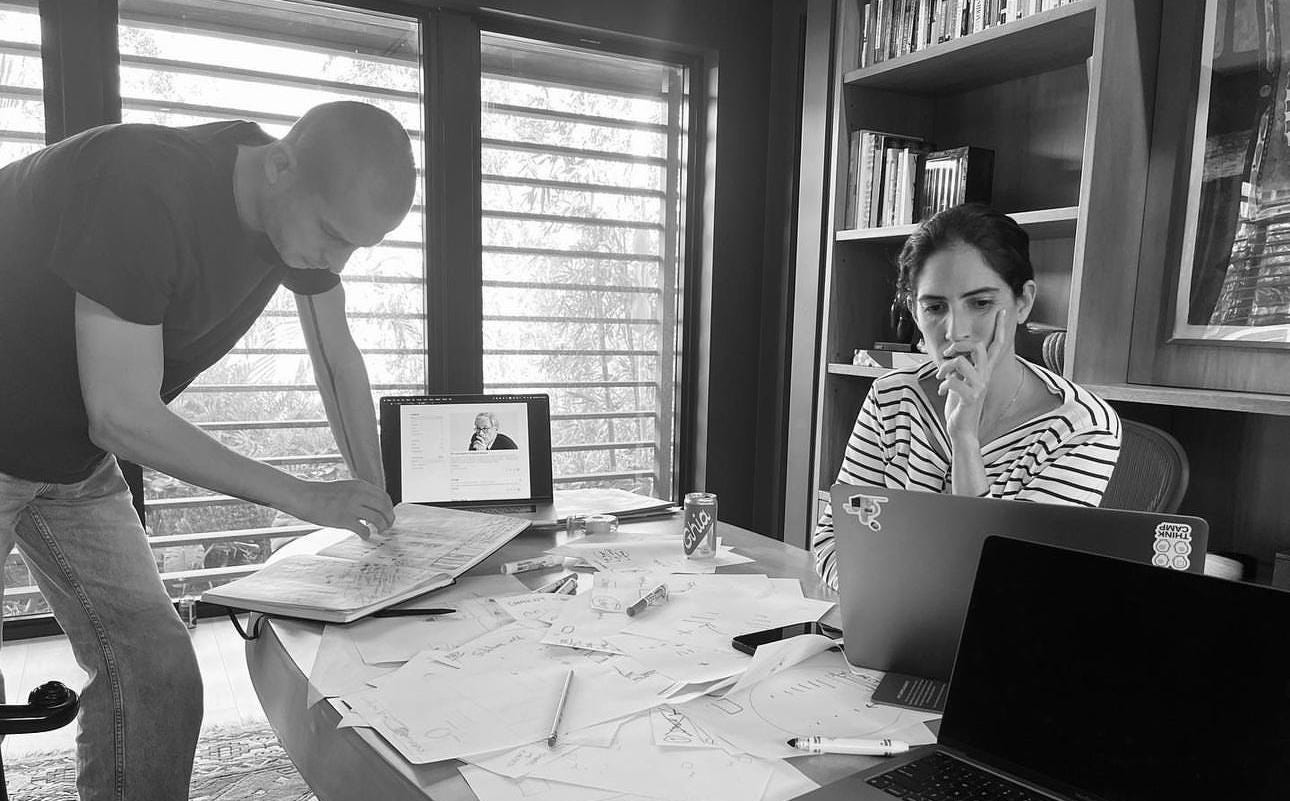#50 Sari Azout asks, "could things take time?"
the founder of Sublime on a different way to be (on the internet)
“The insight that set me on this journey was: I'm this person that's obsessed with ideas, always collecting them in some way. Why am I doing this alone?”, Sari Azout, founder of Sublime, tells me during our hour-long call.
You know those moments when someone says something, and you want to safekeep their words? A spark of inspiration to return to when you need it most. Sari’s words have felt that way to me for years. And fittingly, the company she’s been building is designed for just that.
This week, after 20 months in the making, Sublime has officially launched. Throughout that time, Sari’s description of Sublime has evolved—an evolution that makes following a founder’s journey so compelling: the relentless pursuit of something just out of reach. Depending on who you ask1, Sublime is a knowledge management tool, bridges to other minds, or a human-curated search engine.
Sari’s work resonates because she always returns to the idea of ideas—the ways we collect, connect, make sense of them. I think there’s a certain boldness in trying to capture the intangible, in creating a product that shapes a different way of being (online). When so much of building companies today is dictated by speed, efficiency, and profit, Sublime feels like it’s built with heart.
In this conversation, we dive into:
Positioning an early-stage product, especially one that resists easy definition
Building a tool that sparks awe and aliveness (the audacity!)
Following someone’s process from spark to breakthrough
The courage to ask, “but why does it have to work that way?”
The question: Could things take time?
I hope you enjoy reading! It’s a conversation you can hopefully return to, uncovering new insights each time. And one last thing: At the end of this post, you’ll find a link to try Sublime for free, courtesy of Sari and the Sublime team.
—Pin
That's fascinating, to see how this space to play, to take inspiration seriously, can slowly lead to these bigger breakthrough moments.
Balancing vision with a healthy dose of practicality
PIN: When I think of Sublime, I think of something that is expansive and hard to contain. Reading what you write about building Sublime, I feel like you relate to that feeling. When did you realise that you didn't have to put Sublime in just a few words?
SARI: Oh man. You just hit something that feels so alive for me. In fact, I would say the collection on Sublime that I've been nurturing is called Unexplainable, where I try to capture this frustration of living in a world where everything needs to be explainable and categorisable, but feeling devoid of words. Even this morning I was reading a newsletter and a phrase caught my attention—"it feels like trying to explain a garden with a calculator"2—so I just dropped that in.
We live in a world where there is so much competing for our attention, and so there is this constant pressure to collapse everything into a tiny square that can be understandable immediately. For me, it's been a journey of simultaneously being willing to explore the fertility of that terrain that is not easily definable, but also acknowledging the realities of the market.
I always think about Sublime as having two sides. There's this sandbox where we experiment and play with all of our values and beliefs—around the future of the web, creativity over productivity, and what it means to build. On the other hand, when you're building stuff that you want people to use, you have to balance that with a healthy dose of practicality.
And so I get a kick out of writing and expressing that frustration, but at the same time, we are not neglecting the fact that for somebody that's new to Sublime, you have to proof how this is valuable to them. I don't think that we'll ever reach a point where I'm like, damn, we nailed this tagline. If you think about the iPhone, Notion, Airtable, The Browser Company, I think we're just starting to inhabit spaces that transcend the utilitarian. There's a felt sense of what it is that is hard to put into words, if that makes sense.
Playing the long game
PIN: It is like getting to know a person, you need time. If someone is not going to stick around long enough, Sublime might not be the right fit for them right now. It could also be about presenting Sublime differently across various channels.
SARI: Totally. It’s tricky, right? We've made certain business decisions to be consistent with that. For example, we don't have a monthly plan. We only support annual plans or lifetime plans because we want to bias for long-term customers. It is a balance though at the end of the day, the truth is that if you look at the realities of the market, the average person downloads zero apps a month. Everyone is incredibly overwhelmed. We're following a different kind of playbook, and I guess it remains to be seen—the market will vote.
Early-stage positioning: Be a bystander of your own thing
PIN: Can you share some words of advice for people who are building something in its early stages?
SARI: The thing is, I used to do positioning for other startups. For years I was running this strategy team at a startup studio, and it was so easy to do that for other people. But when it comes to my own thing, it's so hard. So the advice that I try to follow is: when it's your own thing, try to be an objective bystander.
Take Airbnb, when they were first getting started, their tagline was something like Find a place to stay.3 It was very functional. But then over time, as they had built a brand, they earned the right to be a little bit more lofty and transitioned to Belong Anywhere. So much of building Sublime has been acknowledging where we are in time and space, while resisting dumbing it down and saying, “here's a tool to save things”.
Another key aspect of positioning is that many founders, deeply obsessed with what they're building, often fall into the trap of centring the narrative around themselves rather than the customer. When you tell somebody something like, “we're going to build a human-curated inspiration engine”, the reality is that for most people, the product is all there is, the product either works or it doesn't.
Where private thought meets public insight
PIN: Another thing that I think about Sublime is that it sits between the tensions of say, personal versus professional, emotional versus logical. I feel like it allows me to access parts that are a bit more private on a public platform. Is the goal of Sublime to help people explore these different facets of themselves?
SARI: Yeah, the insight that set me on this journey was, “I'm this person that's obsessed with ideas, and I'm always collecting and capturing them in some way. Why am I doing this alone?” All of this work that is so deeply personal that could benefit other people—why don't other people have access to this?
I became interested in Marshall McLuhan’s medium is the message. So many of the spaces that we have online, they're either deeply private and personal and focused on utility and intention, or they're social and focused on broadcasting and fame and audience-building.
Much of what we're trying to do is thread that needle between Sublime as private knowledge tool and Sublime as public digital garden. To get to the heart of your question, I really think that in a world where AI is commoditising content and output, so much of the value is going to be in the process. It's not just “Pin's interview”. It's “how did Pin arrive at her interviewing style? What are the people, the references, the things that inspired her?” I think that these artefacts of humanity, in a sense, will become so much more important. Some of that stuff should be kept private, but I do think that the web has this binary between private and public, and we're trying to explore the in-between.
From the Attention Economy to the Intention Economy
PIN: I really like what you said about the artefacts of humanity, and I feel like Sublime helps people to connect with other people, while still being able to look within and find what they are trying to say.
SARI: If I had to sum up the ethos of the company, and what I deeply believe in, it is that we need to transition from the attention economy to the intention economy. We basically have all of these tools and platforms that compromise our ability to make sustained progress on anything, to focus on anything. And so we're scrolling and discovering all of these things out of context.
With Sublime, the hope is that you can discover and feel connected to other people, but in the context of something more intentional. We don't have a for you feed that is designed to keep you trapped there for hours, which is probably why people don't open Sublime when they have a minute in line at Starbucks or whatever.
Creating spaces for possibilities; a letter from a Sublime user
PIN: I think that prioritises ideas over vanity metrics. On the topic of people, I wanted to take a moment to talk about the Sublime community. From your events to the Slack channels, you’re constantly receiving real-time feedback from your users. Have there been any standout moments where Sublime has impacted someone in a way that surprised you?
SARI: It's so interesting because essentially, I'm sitting behind the screen for 10 hours a day building this product. And because of the way the product is set up, there's not a lot of dopamine hits, and we don't really track revenue or how many minutes Pin spends on Sublime. So I think what the feedback does, is it builds a human bridge between this process of building software, which is far less tangible than opening a bakery down the street.
There's one letter in particular that made me cry. It was from somebody talking about how they felt like a misfit growing up, and how Sublime is a space that gives them hope.
If you were to ask me, what is it that you want? I think that the name Sublime in itself is so powerful. I want to be able to transport people to this feeling of believing in possibilities, feeling this sense of awe and aliveness. And there's been several interactions that I've had with users where they articulate how Sublime led them to those feelings. That gives me fuel for months.
Building for thinkers and their breakthroughs
PIN: Who would you like to see on Sublime that is not already on it?
SARI: Recently the language that I'm using to describe who Sublime is for is the internet's creative class. I think that’s an archetype of a person that is in love with ideas and looking for a different way to be, so to speak, on the internet. Our lives would be easier if we pigeonholed and said, this is a tool for writers or this and that. But it's so much more interesting and meaningful to build something that's a little bit more horizontal.
So much of that process of launching [publicly] is getting over the cringe of reaching out to your heroes. And I have a list which I could reference, and some of the people on there are Haley Nahman, Ava from Bookbear Express4, or Austin Kleon who has written a ton of books on creativity.
From a growth perspective, it'd be great for us to tap into more influential networks of people, and I know that we will. But personally, what's most interesting is the people whose work I love and follow, and I'd love to see the behind the scenes of that stuff. What if I pull the veil on it?
For the people that are on Sublime, I often see what they're adding and then weeks later they have the polished product. Somebody that comes to mind is Rob Hardy. He adds all sorts of interesting things in collections and he had a breakthrough moment at some point where it's like, "oh, what I'm deeply interested in is writing manifestos, so I'm now going to build a business around helping companies write them.” And that breakthrough happened on Sublime—you can see by navigating through his cards how it occurred. That's fascinating, to see how this space to play, to take inspiration seriously, can slowly lead to these bigger breakthrough moments.
The power of gradual
PIN: Looking back on your journey, is there something that has shifted for you since building Sublime?
SARI: The biggest thing is: could things take time? I think we live in a world where it's so easy to get caught up in so-and-so's doing this faster; I feel like the best thing to do is put your blinders on and focus, and over 10 years it's going to compound into something beautiful. I'm consistently humbled by gradual. The process of distilling something to its essence takes time and effort.
As somebody who's very heady, it's easy to assume when you're building a company that thinking about something longer is going to generate the results that you want. But I do think that in some sense, action breeds clarity.
The barrier is no longer information
PIN: You also have to trust the process, that you are chipping away at something that would eventually reveal itself. What is something that you have discovered about yourself over the past couple years?
SARI: I think that it's easy to become cynical these days and assume that something works a certain way because that's the way it should be. I’ve realised that I do have this reflexive instinct, but why does it work that way? Why can't we do it differently? The internet is monetised by ads or subscriptions, but why can't we innovate on a choose-what-you-pay model? I default to assuming that the way that things are doesn't have to be, and there's agency that comes with that. I’m interested in this concept of agency because I think we do live in this post-information age where the barrier is no longer information, it is courage, willingness to act, and intention.
“Slow AI”
PIN: What’s a question you’re hoping will be answered a year from now?
SARI: One that feels particularly timely is that we have this great technology AI, and everyone's using it to try to do more faster. The thought I have is, what does slow AI look like? How do we not react to what everyone else is doing, slapping all these AI features to click a button and generate an output? How do we make something wonderful instead of make something fast?
Software is not just a collection of buttons and clicks. It is really a way to manifest beliefs and shape outcomes. So if you believe that we shape our tools and that they shape us, then it really matters how we use those tools.
The long arc of things
PIN: I don’t think I’ve ever heard “slow” and “AI” in the same breath, I love that you’ve planted that idea in my mind. I’d like to end off by asking, who’s someone that you're curious about?
SARI: I'm curious about people who work for many years on something and then come out on the other side with something great. One person that comes to mind is Lin-Manuel Miranda with Hamilton. You could see that there was such a manifestation of care and sweating the details in everything, but it requires this long term willingness to be misunderstood. I’m deeply interested in the mindset but also like the practicality of, like, how do you go really deep on something for seven years given the constraints of the market? How do we fund that kind of work?
I believe that so many incredible things are possible if we give enough focus and intensity to one thing for long periods of time. I'm fascinated by people who have done that, especially in this world where the happy path is becoming a TikTok influencer and getting immediate gratification. What Lin-Manuel Miranda did feels like the antidote to that, and I’d like to get inside of his head.
PIN: That is interesting because that is how I've seen you as well—I feel that there is a through-line in terms of the things that you’ve been building and talking about over the last few years. There is this sense of dedication, and it feels like you're in it for the long haul.
SARI: I'm a woman, with three children. We see all of these articles like 30 under 30, that's the classic New York City, tech type thing. I'm much more interested in say the founder of Estée Lauder—she had to put her career on hold because of her personal life, but then she carried that obsession with her. I'm drawn to the long arc of things.
Find Sari on X, Sublime, and Substack.
As promised, here’s the link to try Sublime.
And you can view my Sublime profile at sublime.app/pinpinpin. My collections include feeling something, this path, not knowing.
Here’s how people would describe Sublime at the dinner table.
From Haley Nahman’s newsletter issue titled Beyond explanation. It felt like a spark of connection in the moment, as I’d read the same post that morning.
I believe it was actually "Book rooms with locals, rather than hotels”.
Another magical moment for me, as Haley and Ava are also writers I read religiously and pay for.






